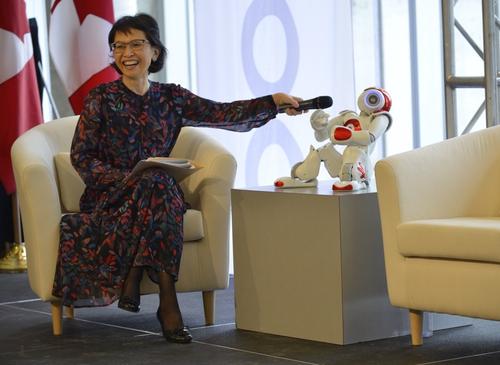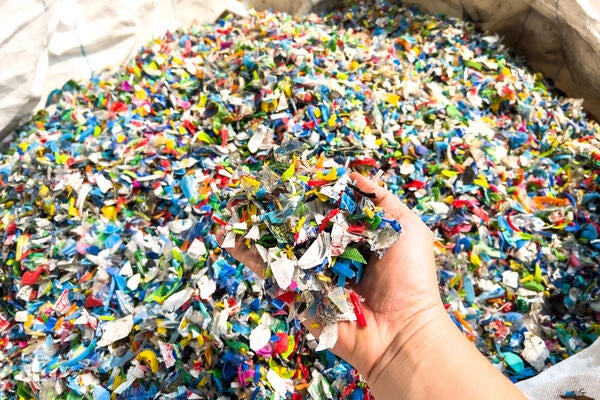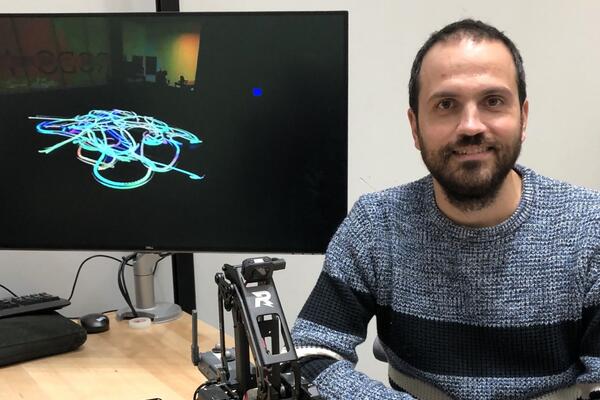
Harnessing the vast potential of AI
Waterloo Engineering builds on expertise developed over the last several decades

Waterloo Engineering builds on expertise developed over the last several decades
By Brian Caldwell Faculty of EngineeringTapping the power of artificial intelligence (AI) is at the heart of several new initiatives at Waterloo Engineering, including an institute to foster collaboration with industry partners and an option for high-achieving undergraduate students.
While building on expertise developed at Waterloo in the last several decades, the initiatives recognize and anticipate the tremendous potential of AI technology to evolve, improve and expand in the future.
“This is going to impact our businesses, our economy and our lives,” Pearl Sullivan, dean of Waterloo Engineering, told hundreds of people on hand for the launch of the Waterloo Artificial Intelligence Institute in April.
 Pearl Sullivan, dean of Waterloo Engineering, interviews humanoid robot Nao at the launch of Waterloo.AI
Pearl Sullivan, dean of Waterloo Engineering, interviews humanoid robot Nao at the launch of Waterloo.AI
A joint venture of Waterloo’s engineering and mathematics faculties, the institute focuses on campus-wide research in AI and gives outside organizations easy access to its expertise.
“We want to make sure that the efforts and work being done by our professors, researchers and students shine to the outside world and benefit society,” says Fakhri Karray, an electrical and computer engineering professor who is its co-director.
The institute brings together almost 100 faculty members to take on both practical and fundamental problems brought to them by partners in business, government and the non-profit sector.
It also provides a kind of “reverse co-op” consisting of short courses in AI for people working at partner companies.
“Industry collaboration has long been one of the major strengths of the University of Waterloo and we continue in that tradition through the institute’s many planned activities,” says Karray.
A spotlight also shone on AI at Waterloo Engineering when it was announced earlier this year as a key player in an industry-led consortium dedicated to driving economic growth by applying the technology to supply chains.
SCALE.AI, which involves more than 100 companies, universities, research institutions and other organizations, was one of five proposals selected by the federal government for a share of up to $950 million in financial backing through the Innovation Superclusters Initiative.
Samir Elhedhli, chair of Waterloo Engineering’s management sciences department, says the five-year project comes at a time when the use of AI in supply chains is primed for a quantum leap forward thanks to factors including advances in algorithms and computational resources.
“All the magic ingredients are now in place for researchers and industries to take advantage of them,” he says.
SCALE.AI aims to harness the power of AI by combining data analytics and optimization software tools with new robotics, communications and Internet of Things (IoT) technologies.
The ultimate goal is a supply chain – from initial product idea, to manufacturing, to customer delivery, to end-of-life recycling – with improved efficiency, agility, visibility and sustainability.
Waterloo researchers contribute by helping specific companies adopt AI supply chain tools, as well as refining and developing new tools.
Some of the experts who use those tools may rely one day on lessons learned through a new AI option for undergraduate engineering students.
The option – also available to math and computer science students in a modified form – is scheduled to begin in September with about 75 students after an “overwhelming” response.
Applicants must have at least an 80 per cent average and take seven advanced courses in their third and fourth years to earn an option designation on their degrees.
“Artificial intelligence used to be a very specialized area of math, computer science and advanced engineering, but now we realize its importance in all aspects of life,” says William Melek, the Waterloo mechanical and mechatronics professor who coordinates the option. “That’s why we want to equip our students with this knowledge before they go out into the workforce.”

Hand holding small pieces of cut colourful plastic bottles, which Waterloo researchers are now able to convert into high-value products using sunlight. (RecycleMan/Getty Images)
Read more
Sunlight-powered process converts plastic waste into a valuable chemical without added emissions

University of Waterloo researchers Olga Ibragimova (left) and Dr. Chrystopher Nehaniv found that symmetry is the key to composing great melodies. (Amanda Brown/University of Waterloo)
Read more
University of Waterloo researchers uncover the hidden mathematical equations in musical melodies

Read more
Robots the size of a soccer ball create new visual art by trailing light that represents the “emotional essence” of music
The University of Waterloo acknowledges that much of our work takes place on the traditional territory of the Neutral, Anishinaabeg, and Haudenosaunee peoples. Our main campus is situated on the Haldimand Tract, the land granted to the Six Nations that includes six miles on each side of the Grand River. Our active work toward reconciliation takes place across our campuses through research, learning, teaching, and community building, and is co-ordinated within the Office of Indigenous Relations.